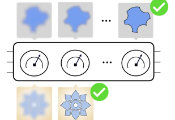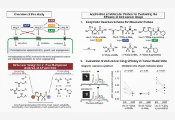The Data Delimma: How Quantum Memory Could Ease the Energy Demands of Computing
October 19, 2024 -- As AI's energy demands grow due to massive datasets, quantum memory offers a promising solution by processing and storing data more efficiently. Recent research shows that quantum memory can reduce the computational steps needed, cutting both time and energy use. This could make AI more sustainable, as less data would be required to achieve the same results, significantly lowering its energy footprint. While still developing, quantum memory has the potential to reshape data processing and storage across industries.
In a world powered by artificial intelligence applications, data is king, but it’s also the crown’s biggest burden. As AI models grow more powerful, they devour increasing amounts of data, raising a pressing issue: energy consumption. Beyond creating larger datasets, there are growing concerns about the power required to process them, especially as AI’s footprint continues to expand.
While quantum computing has been thrown around as a potential solution that may one day possibly contribute positively to the energy burden, that is largely speculation– but there is perhaps a bit of truth in it, albeit indirectly. As highlighted in a recent article from Quanta, while much of the quantum industry is focused on achieving faster computations, an equally promising advantage may lie in data reduction that could address AI’s energy usage bottlenecks.
From Vast Data to Smart Storage
As described in the article, quantum memory stores data in ways that classical memory systems cannot match. In quantum systems, information is stored in quantum states, using the principles of superposition and entanglement to represent data more efficiently. This ability allows quantum systems to process and store vastly more information, potentially impacting data-heavy industries like AI.
In a 2021 study from the California Institute of Technology, researchers showed that quantum memory could dramatically reduce the number of steps needed to model complex systems. Their method proved that quantum algorithms using memory could require exponentially fewer steps, cutting down on both time and energy. However, this early work required vast amounts of quantum memory—an obstacle that could have limited its practical application.
Now, two independent teams have derived additional insights, demonstrating how these exponential advantages can be achieved with much less quantum memory. Sitan Chen from Harvard University, along with his team, found that just two quantum copies of a system were enough to provide the same computational efficiency previously thought to require many more.
According to researchers, the efficiency gains from quantum memory may not lie solely in speed, but in its ability to process more data with fewer resources. For industries dependent on data, such as AI, this could represent a shift—one where less data input leads to equally accurate, if not better, results. Reducing the need for vast datasets could also influence a cut in energy consumption, aligning with the growing push for more sustainable computing.
Redefining Quantum Advantage Through Data-Driven Efficiency
While “quantum advantage” has traditionally been framed in terms of speed, quantum memory brings a new dimension to the discussion. With less data needed to achieve the same outcomes, the potential for energy savings is notable. Google Quantum AI researchers also recently highlighted this, showing that their algorithms could solve complex quantum chemistry problems using far fewer measurements, thanks to quantum memory.
Hsin-Yuan Huang, a physicist at Google Quantum AI, noted, “It allows us to, in the more near term, already achieve that kind of quantum advantage,” referring to the ability to perform tasks with less data. This shift may not only make quantum computing more practical but could indicate a turning point in the development of sustainable AI technologies.
Quantum Memory’s Future Role in Sustainability
For AI, quantum computing, and other data-heavy fields, quantum memory presents an opportunity to rethink how we approach data processing and storage. As these technologies develop, quantum memory may be the missing piece that allows AI to continue scaling without the escalating energy costs we currently face.
Although it’s too early to say whether quantum memory will transform data consumption, the initial research indicates potential. As the technology develops, quantum memory could influence not only the field of quantum computing but also a range of other industries that rely on data and energy efficiency.




































